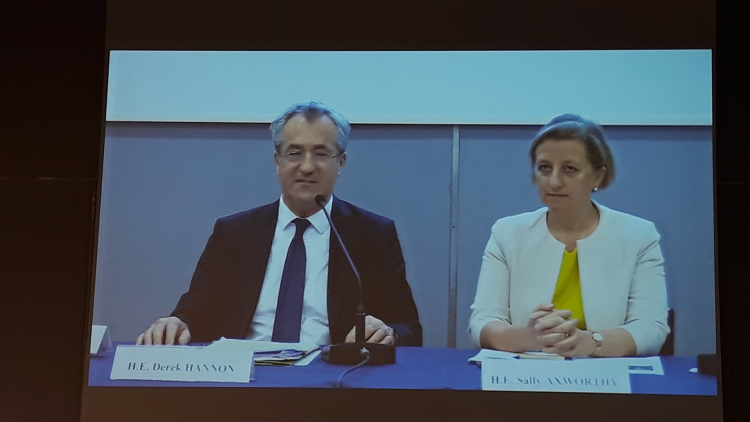
Ireland and Britain fight modern slavery
By Sr Bernadette Mary Reis, fsp
While participating at an event hosted by the International Union of Superiors General, the Ambassadors of Ireland and Britain to the Holy See took the opportunity of presenting their respective government’s anti-slavery, anti-trafficking policies.
Ireland against trafficking
Derek Hannon, the Irish Ambassador to the Holy See said that Ireland is committed to combatting human trafficking, both “domestically and in cooperation with our international partners”. Central to the “development and execution of our national action plan to combat human trafficking”, is the implementation of the UN Global Plan of Action Against Trafficking in Persons, the Ambassador said. Ireland developed this plan after consulting “partners” at both the national and international levels, and those representing society at large as well. It contains a “clear, collaborative program to advance the fight against trafficking and enhance protection of victims”. Ireland, he said, has also established an anti-trafficking unit, updated its legislation, inaugurated structures at the judicial, investigative and medical levels, and is committed to placing victims and their human rights “at the centre of the response to human trafficking”.
Britain combats modern forms of slavery
Sally Axworthy, the British Ambassador to the Holy See explained the programs adopted in the UK to eradicate modern forms of slavery. She said that Britain’s modern slavery policy began in 2004 when 23 Chinese fishermen working under slave conditions in Morecombe Bay died because their “gang master” put profit over their safety. “It shocked public opinion that such a thing could happen”, the Ambassador said. Not only is there a modern slavery problem in the UK, Axworthy said, but it also gets a lot of publicity. “In seemingly very normal places, there will be people being trafficked in the UK to work in car washes” or nail bars, she said.
Statistics of modern slavery in the UK
Forced labour and sexual exploitation are the leading areas where victims of trafficking find themselves, followed by domestic labour. Of the roughly 1,650 cases reported to the National Referral Mechanism between April and June 2018, 695, or 42%, involved minors. Internationally, at any one time in 2016, an estimated 40.3 million people were experiencing modern slavery. That means for every thousand people, there are 5.4 victims. One in four victims is a child. Modern slavery affects women and girls disproportionately: 99% of women in the sex industry, and 58% in other forced labour areas.
Britain’s response to modern slavery
Britain passed the Modern Slavery Act in 2015 which “brought together all our existing offenses into one Act”, the Ambassador explained. Prevention is one component of Britain’s response. “There are lots of posters in the UK, telling people how to spot when people are at risk”, Axworthy said. Victim support is a second category through which victims have access to such things as “housing, health care, education counselling” for a period of 45-90 days. Supply chains are a particular focus of scrutiny. Any company with more than 250 employees must “to produce a report saying how they are tackling modern slavery”. In this way companies are encouraged to be aware if there is “slavery in their supply chains”. Bringing human traffickers to justice has resulted in “1000 convictions for modern slavery offenses” since 2010, the Ambassador said.
At the international level
Along with the Holy See, Britain lobbied for Sustainable Development Goal 8.7 so that it remains on the United Nation’s agenda. Prime Minister Theresa May launched a “Call for Action” in 2017 at the UN which “sets out all the things that we think make part of an effective response to modern slavery”. Around 80 countries have signed on to it as Britain seeks to revitalize international collaboration. Britain aldo funds projects overseas. Some of these funds go to the International Union of Superiors General who, through Talitha Kum, is actively part of anti-trafficking activity, especially in Africa. Finally, she mentioned the Santa Marta group, a collaboration between Bishops, and law enforcement where information is exchanged at an annual meeting.
Thank you for reading our article. You can keep up-to-date by subscribing to our daily newsletter. Just click here







